Responsible banking and the SDGs
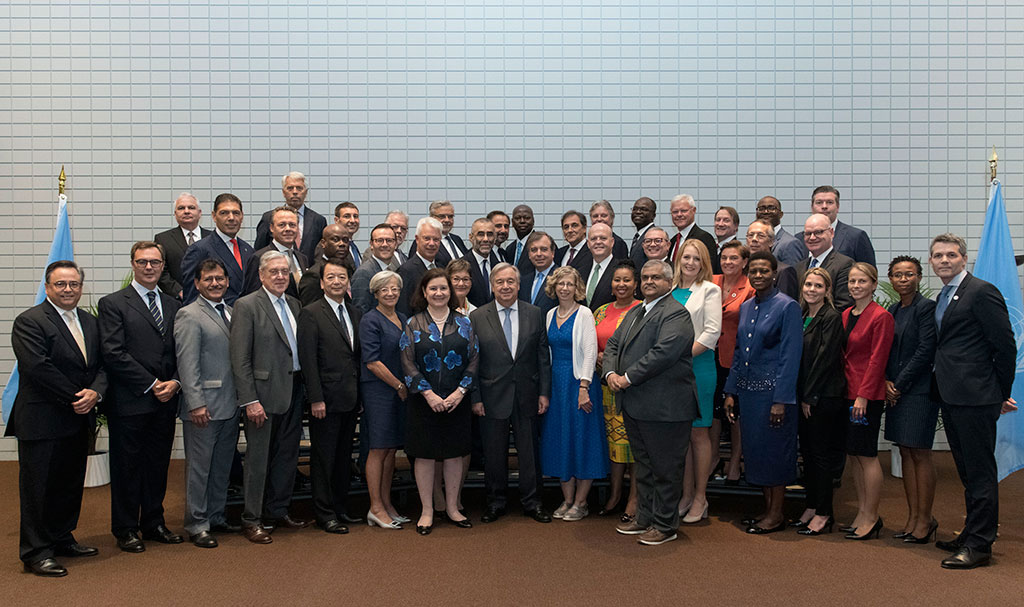
International sustainability guidelines for banks
In September 2019, Lilja Björk Einarsdóttir, CEO of Landsbankinn, signed new Principles for Responsible Banking at the UN General Assembly in New York. Landsbankinn thereby joined a coalition of 130 banks from around the world. The Principles are intended to strategically align financial activity with the UN’s Sustainable Development Goals and the Paris Climate Agreement.
Taking place at the start of the UN General Assembly, the official launch of the Principles for Responsible Banking marked the beginning of the most significant partnership to date between the global banking industry and the UN. The Principles were developed by 30 international banks under the auspices of the United Nations Environment Programme Finance Initiative (UNEP FI) of which Landsbankinn is already a member. By signing them, the banks commit to focusing their efforts where they have the greatest impact – in their core business – and set, publish and implement ambitious targets to scale up positive and address any negative impacts in line with global and local goals. This is the first global framework that guides the integration of sustainability across all business areas of banking activity.
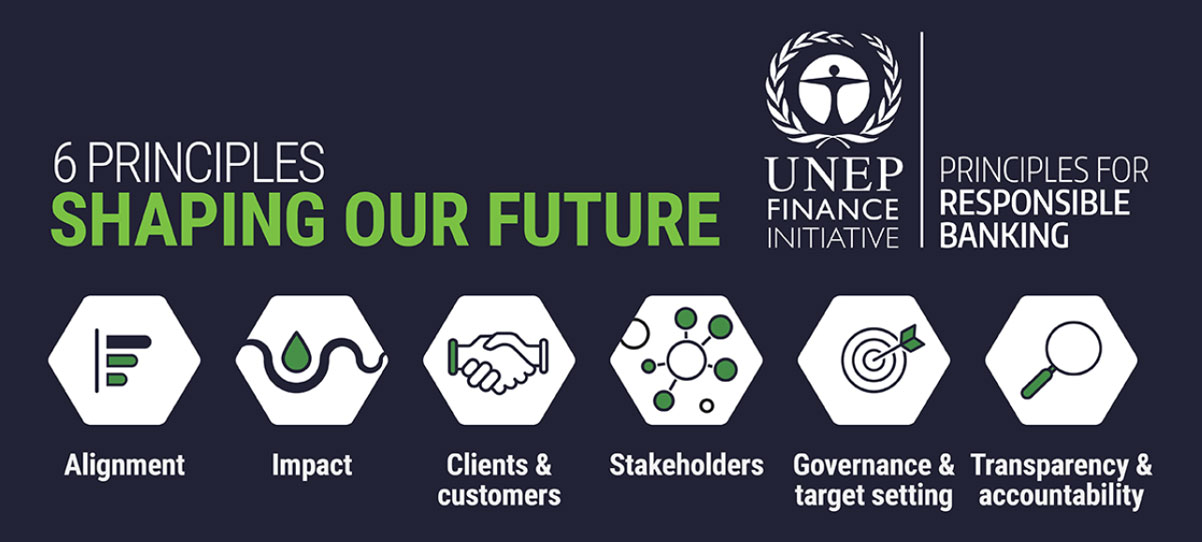
The Principles set the global standard for what it means to be a responsible bank and will ensure that banks create value for both their shareholders and society.
Alignment: Align the business strategy of banks to be consistent with and contribute to individuals’ needs and society’s goals, as expressed in the Sustainable Development Goals, the Paris Climate Agreement and relevant national and regional frameworks. It is important that banks concentrate their efforts where they have the greatest impact.
Impact: The banks shall seek to increase their positive impact while reducing the negative impact of their operation, products and services on individuals and the environment.
Customers: The banks shall work responsibly with customers to encourage sustainable practices and enable economic activities that create shared prosperity for current and future generations.
Stakeholders: The banks shall take the initiative to responsibly consult, engage and partner with relevant stakeholders to achieve society’s goals.
Governance & target setting: The banks shall implement their commitment to these Principles through effective governance and a culture of responsible banking, demonstrating ambition and accountability. Key targets and the impact of this work shall be made public.
Transparency & accountability: The banks shall periodically review their individual and collective implementation of these Principles and be transparent about and accountable for their positive and negative impacts and contribution to society’s goals.
Further information on the six Principles for Responsible Banking.
Commitment to the Principles for Responsible Banking means that Landsbankinn must set measurable and time-bound goals based on guidelines from UNEP-FI to work to achieve the SDGs in its operation. Landsbankinn had previously disclosed which three of the SDGs it intended to focus on. This work will be reviewed annually to increase the likelihood of achieving success. For more details on the goals and their shaping, turn to the chapter Goals.
The banks that endorse the Principles also agree to assist each other and share information about effective methods. As the banks in the group operate in widely different locations throughout the world and are variously advanced as regards sustainability, this is a good platform for peer learning.
Principles for Responsible Banking
1. Align strategy with the SDGs and the Paris Climate Agreement.
2. Boost positive effects on society and the natural environment and reduce negative impact.
3. Work towards sustainability together with customers.
4. Work with stakeholders to achieve society’s goals.
5. Responsible and effective governance and target setting.
6. Transparency and accountability about both positive and negative impacts.

SDGs a part of sustainability policy
Landsbankinn is committed to adhering to the UN's Sustainable Development Goals in its operation. Emphasis will be placed on working to achieve three of the SDGs: Goal 5 on gender equality, goal 8 on decent work and economic growth, and goal 12 on responsible consumption and production. The chosen SDGs all relate to the Bank’s activities and as such allow the Bank to maximise the positive impact of its work on the environment and the community.
The UN’s SDGs
The United Nations presented their Sustainable Development Goals (SDG) in 2015 as replacement for the Millennium Development Goals (MDG), set around the turn of the century. The SDGs are more numerous and specific than the MDGs and focus on the pressing challenges facing the entire world. Below is a review of each SDG and their sub-goals.

- Landsbankinn is committed to adhering to the UN's Sustainable Development Goals in its operation.
Article on Umræðan (in Icelandic)
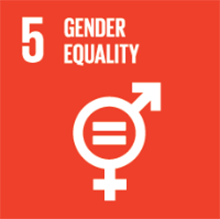
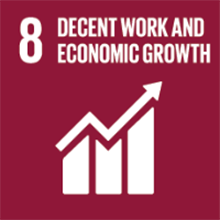
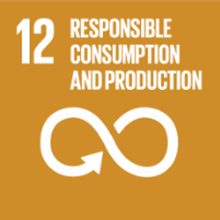
Goal 5 - Gender equality
Landsbankinn has over many years made a point of ensuring that men and women receive equal pay for equally valuable work and enjoy the same job opportunities. Landsbankinn has twice been awarded the golden seal of PwC's Equal Pay Audit and, in March 2019, the Bank achieved legally required equal pay certification.
A detailed coverage of equality at Landsbankinn is presented in the chapter on Equality.
Goal 8 - Decent work and economic growth
Goal 8 promotes sustained and sustainable economic growth, full and productive employment and decent work for all. Landsbankinn supports this goal in various aspects of its operation. Landsbankinn signed a seven-year loan agreement with the Nordic Investment Bank (NIB), the terms of which provide that Landsbankinn re-loan the funds to small and medium-sized enterprises and environmental projects in Iceland.
Landsbankinn has approved sector policies that incorporate guidelines on sustainability for the following industries: fisheries and seafood, real estate companies, construction companies, holding companies, the travel industry, commerce, services, IT and telecommunications. Landsbankinn contributes to the improvement of access to banking and financial services for all with the country’s largest branch network and most ATMs. Landsbankinn's community grants and scholarships support local culture.
Goal 12 - Responsible consumption and production
Goal 12 focuses on ensuring sustainable consumption and production patterns. Landsbankinn contributes to responsible consumption and production through various aspects of its activities and has a wide-reaching effect on the community.
In its efforts to reduce food waste, general garbage production, boost recycling and decrease waste in general, Landsbankinn has made rapid headway towards becoming a paper-free bank, reduced waste and garbage from its operation and now runs a Nordic Swan ecolabled canteen.
To reduce the emission of compounds and chemicals into the atmosphere, water and soil, Landsbankinn has offered retail customers favourable terms on funding of ecofriendly vehicles and reduced its own fuel use and greenhouse gas emission, uses ecolabelled cleaning products and sanitary towels, offers transportation grants to employees and offsets carbon emissions from all work-related employee travel both domestically and abroad.
Landsbankinn promotes sustainable practices in its procurement and takes its business to local suppliers, with 89% of the Bank’s suppliers in 2019 being local.
The chapter Indicators in this Report contains details about environmental aspects of the Bank’s operation; development of paper use, waste treatment, fuel use, carbon offsetting and other environmental concerns. Landsbankinn has published ESG reports annually since 2011, in compliance with the standards of the Global Reporting Initiative (GRI). The trajectory of the Bank’s efforts under CSR and sustainability can be tracked through the yearly reports.
Landsbankinn is working to reduce GHG emissions through SDG 12. By supporting responsible consumption and production, a behavioural pattern emerges that leads to lower GHG emissions.